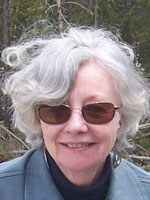Poems by Jeanne Wagner
Archives: by Issue | by Author Name

During the Power Outage
by Jeanne Wagner
Jeanne lives on the east side of San Francisco Bay with Cerrito Creek, and the canyon it forms, in her "backyard," where black-tailed deer, turkey vultures and a dwindling population of raccoon and possum still roam.

We bent in close to the candles,
the firelight,
our heads inclining over the page,
then lifting up,
as if in ritual prayer.
We were more restless in the semi-dark,
more calm,
as if the world of our rooms could
contain us,
we its dark continents, husbanding
each flame
as if there were a new kind of coldness,
a new kind of heat.
© Jeanne Wagner
Flight
by Jeanne Wagner
From Canary August/September 2009

(In Colony Collapse Disorder, beekeepers open their hives
only to discover they are suddenly and mysteriously empty.)
No trace of the workers: no small, desiccated bodies,
no pinched-off thorax or eyelash-legs littering the combs.
Even the rice-grain larvae are missing from their nurseries
of wax. Sometimes, though, there’s a queen, still reigning
but helpless. Where have her ladies-in-waiting gone?
It’s the myth of a fled populace: Hamlin or Mesa Verde,
Machu Picchu, its terraces stacked in green silence,
the old hierarchies disassembled and lost. We dream
of a clean break, the tomb found empty, of exodus from
a harsh country: ghost swarms, drunk on their own honey,
clover parting under their wings like the Red Sea.
Winner of the 2008 Soul-Making Literary Competition
Originally published in the Georgetown Review
© Jeanne Wagner
Prunus subcordata
Native Wild Plum
by Jeanne Wagner
From Canary Fall 2016

The plum trees are effervescing again,
nudging their ruction of buds
too close to my window,
pushing at me with their promiscuous beauty,
ravenous as fire in its own way.
All the fissions of nature at work.
I can guess why my neighbor
wants to cut them down,
the cells in his blood, called blasts,
indecently raging, while he talks about
how trees draw lightning;
last year an acacia fissured down the center,
exposing what used to be symmetry
into a splay of roots so unseemly
he could barely stand to look.
Now he tells how me I should give
all my plum trees the chop;
they’ve become too crazy, too rife.
Spring spreading its usual shrapnel of blossoms,
but in a few months, mark his words,
there’ll be wild plums so small
they’re passed off as cherries, skin broken
and bitter-sweet,
their juices smearing the deck,
whole families of deer gorging on windfall.
I want to tell him I’ll miss the way such fullness
makes the slender limbs loop down.
Trees so rampant with crimson they blaze,
their branches bursting like the shivery plumes
of those fireworks they call Peony,
Ground Bloom, Willow,
as if even our gardens combust.
First published in Fourth River Review.
© Jeanne Wagner
The Disappearance of the Polar Bears
by Jeanne Wagner

They were our saints and our hermits,
our ursine angels.
In exile they found a promised land
where cold
condensed under their feet and they
walked on it,
where they moved soundlessly as ghosts,
hearing,
even under ice, the strenuous beating
heart of seals.
Some journeyed as far north as the Pole,
that skull-cap of ice,
its whiteness the imagined afterlife of
ordinary bears.
Their bodies grown solid as icons: the
squared-off limbs,
shoulders that tapered to a muzzled head,
dog-small and low slung.
Yet who could fail to love their
black-eyed cubs,
born with the furred innocence
of harp seals;
or the way they swam, legs paddling
in circles,
tractionless as the running in
our dreams.
I’ve read that the silence of arctic ice
lasts through innumerable nights.*
That’s why I keep this image of
a single bear
standing on the pole, his white body
on the whiter ice,
like the pulse of something warm
inside the cold.
Could the problem be the airplanes,
when they scattered
the last angels from their wisps of
cirrus cloud, while below,
on cruise ship tables, ice sculptures
slowly began to melt away?
*from “Seventh” by Anna Akhmatova
“Disappearance of the Polar Bears” first appeared in Medusa in Therapy, Poets Corner Press 2008
© Jeanne Wagner
The Honeybee Fears for the Future
...honeybees were found capable of pessimism.
from "Findings," Harper’s Magazine
by Jeanne Wagner
From Canary Fall 2014

Sisters, I see it coming.
No more bustle on the stoop,
no more tremble dance or pheromone kiss.
Gone the pollen sacs and lacy wings,
swipe of petal and graze
of golden talc against our sides.
Even the flowers will be forgotten:
the blowsy fuchsias and blue hyssop, the miles
of milkweed and lavender, their nectar
the sweet currency of our lives.
Sisters, who will remember the larvae,
how even in the dark the wax around them
felt warm and lit from within,
how we spoke of honey with our whole bodies,
how we swaggered,
how asking where was enough?
Previously published in Posse Review.
© Jeanne Wagner